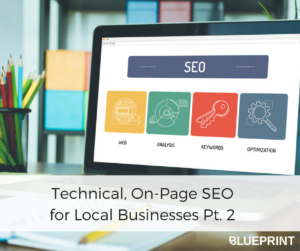To drive more relevant consumers to your business’s website, it’s important to work with an experienced Atlanta SEO company that understands the complexities associated with technical, on-page optimization.
Understanding SEO will help your business appear more often and higher on Google search engine results pages (SERPs) and other major search engines. In addition, you’ll increase online conversions by ensuring that your website’s technical structure is built for organic visibility.
Here’s a breakdown of everything you need to know about on-page SEO.
Technical SEO
To maximize your business’s online visibility and reach, you’ll need to implement technical and on-page optimization techniques. Some of the more rewarding areas of technical optimization include:
URLS
URLs do not support keyword rankings anymore, but they can help increase the number of consumers who click-through to your website. When creating new landing pages, it’s important to try to keep them as short and simple as possible, reducing the number of subfolders within a URL. Search engine crawlers prefer websites that lets them identify and pull content as quickly as possible.
When creating new URLs, you need to include groupings that reflect areas of your site, as well as reflect the type of content you own. Such groupings include:
- Protocol
- Subdomain
- Root Domain
- Top Level Domain
- Subfolder
- Page
It’s important to fulfill new URLs with basic, descriptive keywords that highlight the primary theme or concept of the landing page for which they’re attached. For instance, if your business is dedicated to divorce counsel, and you create a new page that focuses on “Atlanta Divorce Attorneys,” your URL should appear as:
www.divorcecompany.com/Legal-Services/Atlanta-Divorce-Attorneys/
Canonical Optimization

Canonical tags are an important aspect of technical optimization and refer to the process of attributing authority to specific domains or URLs. If you have pages on your website that derive from another domain, canonical tags can protect your business from possible penalties associated with duplicate content, even de-indexation.
If there are multiples versions of a page within your website, or if you have pages copied from other domains, inset a canonical tag on the backend of your site. This communicates to search engines where authority should be attributed to.
Simply implement the complete URL that you want to cite as the original source of authority on the backend of a copied or duplicated landing page. Typos can be detrimental when reproducing a canonical tag, so be careful. In fact, it should be identical to URL of the source you’re citing.
Get in Touch with SEO Experts
If you are interested in elevating your business website to the next level, contact Blueprint’s SEO experts for immediate help. We can make sure that your website’s technical structure is completely optimized to help get you on the first page of Google, as well as every other major search engine.
From creating optimized URLs that allow search engines to easily crawl your site to ensuring other major areas of technical optimization are fulfilled correctly, we are here to help your business maximize its visibility and revenue opportunities. Contact us today to get started.


